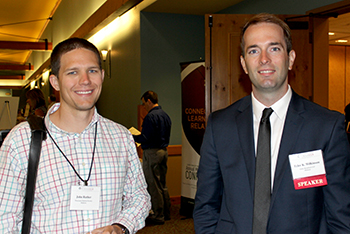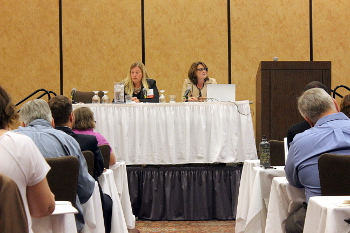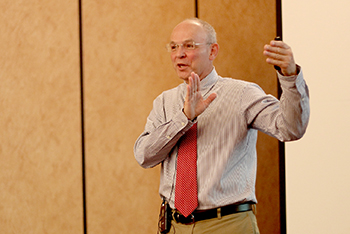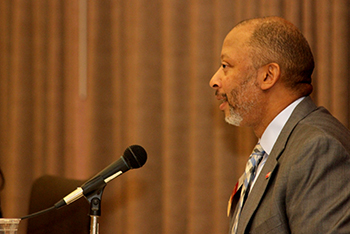Aug. 21, 2015 – According to one litigator, lawyers in depositions should heed Packer Coach Vince Lombardi’s advice: “When you get into the end zone, act like you have been there before.” That is, when a witness admits something significant, don’t draw attention to it.
This was just one of many “litigation tips” offered by litigator Lester Pines at the State Bar of Wisconsin’s fourth annual Health, Labor, and Employment (HLE) Law Institute, which started yesterday and ends today at the Wilderness Hotel in Wisconsin Dells.
Pines, a partner at Cullen, Weston, Pines, & Bach LLP in Madison, provided litigation insight to lawyers practicing in the areas labor, employment, and health law. He offered practical advice based on a 40-year career, including thoughts to help win at summary judgment and trial.
It may sound simple enough, but Pines says it’s worth repeating: “focus your discovery on proving or disproving the elements of the claim.” And pay attention at depositions.
For instance, Pines noted that some lawyers sit back when defending depositions, but listening closely to questions asked by opposing lawyers presents a crucial opportunity to uncover their strategy, or detect when opposing counsel has no strategy at all.

Attorney John Rather (left), of the Wisconsin Medical Society, with attorney Tyler Wilkinson of Axley Brynelson LLP during a session break.
Pines was just one of the many experienced attorneys divulging tips at the HLE Institute. Others discussed substantive law changes and recent developments that lawyers need to know. Here are some of the other top takeaways from the fourth annual HLE Institute.
1. FCA Whistleblower Suits on the Rise
In 2014, the U.S. Department of Justice recovered $5.69 billion under the federal False Claims Act (FCA), which allows persons and entities with evidence of fraud against federal programs or contracts to file qui tam lawsuits on behalf of the government.
The FCA contains provisions that protect “whistleblowers,” who can obtain a reward if their qui tam case results in the recovery of funds by the government. Of the $22 billion recovered by the government since 2009, $14 billion related to healthcare fraud.
Patrick S. Coffey of Whyte, Hirschboeck, Dudek S.C., a panelist on managing FCA whistleblower claims, said that healthcare organizations “should be prepared to respond appropriately to whistleblower or related enforcement activity through improved and more effective procedures that head off complaints or resulting investigatory inquiries.”
2. Overtime Rules Could Change
The U.S. Department of Labor (DOL) has issued proposed rules on overtime pay under the Fair Labor Standard Act. The proposal would increase the standard salary level for workers entitled to receive overtime pay, the so-called “salaried minimum wage.”

Attorney Jill Hartley (left), of The Previant Law Firm in Milwaukee, and Laurie Peterson, of Lindner & Marsack S.C., Milwaukee, gave an "Employment Law Update."
Under current rules, an executive, administrative, or professional employee must be paid at least $455 per week ($23,660 per year) to be exempt from overtime pay.
That figure corresponds to the 20th percentile of weekly earnings for full-time salaried workers in the U.S., as of 2004. The proposed rule would increase that amount to the 40th percentile of weekly earnings for full-time salaried U.S. workers, and the DOL estimates that in 2016, that figure will be about $970 per week ($50,440 per year).
Attorney Laurie Peterson of Lindner & Marsack S.C. in Milwaukee, part of an “Employment Law Update” panel, said employers (and their lawyers) should prepare for any upcoming changes by reviewing the current salary levels of their exempt workers.
“The employer may need to determine whether or not a salary level should be increased to the level expected by the regulations, or perhaps make a determination to convert those individuals to hourly paid employees with overtime,” Peterson said.
3. Cybersecurity Will Be Big in 2016
“2015 was the year of the data breach,” according to attorneys Guy DuBeau and Tyler Wilkinson of Axley Brynelson LLP, who delivered a “Health Law Update.”
Aside from notable financial breaches impacting consumers, at least 100 million patients were impacted by data breaches involving health care providers, and each of them is the subject of one or more class action lawsuits because of it.
“The data breaches and resulting fall-out means that Cybersecurity, or acts to protect against the criminal or unauthorized use of electronic data, will be incredibly important in 2016 and beyond,” noted the panelists, who discussed compliance with privacy and security laws as well as hot topics such as “telemedicine” and other trends.
4. Money Can’t Buy Happiness
Think happiness is tied to money? Consider this: After reaching an income of $75,000 annually, research suggests that money won’t increase a sense of happiness, according to Dr. Gregory Van Rybroek, an attorney and psychologist who delivered a presentation called “The Slipperiness of Happiness: Can Attorneys Capture Well-being?”
“Up to that point, money is helpful to attain a certain level of comfort,” Van Rybroek said. “You can get more money if that’s possible in your life, but you won’t get well-being from it. You have to move into other areas that have to do with personal interests.”

Dr. Gregory Van Rybroek, Ph.D, J.D., offers insights on lawyer happiness.
Dr. Van Rybroek said people, including lawyers, tend to think that happiness can be chased and caught. It can’t. “It’s something that lands on us when we do things that mean something to us, and really is the byproduct of how we spend our time,” he said.
5. Beware the Corporate Practice of Medicine Doctrine
The Wisconsin “corporate practice of medicine doctrine” is a series of restrictions that can limit the ability of physicians (and professionals in other fields), to practice medicine through the corporate form as well as other business entities.
In his presentation on this issue, Adam Tutaj, an attorney at Meissner, Tierney, Fisher & Nichols S.C., said Wisconsin allows physicians to practice medicine through specific entity forms, including the “service corporation” and some professional partnerships.
“However, there are open questions as to other entity forms. Our biggest problem in Wisconsin is that there are no decided cases in this area,” he said. “All of the guidance comes from attorney general opinions, the most recent of which is over 30 years old.”
Assuming they are aware of the issue, the private practitioner will struggle to find direct authority to guide entity formation for physician groups large and small.
“The issue is going to come up early in the choice of entity conversation. You need to be aware of what entity forms are going to work, what entity forms are not going to work, and the risks of structuring the entity in a form that might not be compliant.”
Even if regulators are not active in this area, Tutaj said, running afoul of these restrictions could impact contractual relationships with private third parties.
6. Don’t Get “Clientitis”: Know Your Role as Attorney

Attorney David Cade, CEO of the American Health Lawyers Association in Washington D.C., provides perspectives on the role of lawyers in a "General Counsel Roundtable."
“Clientitis,” according to David Cade, CEO of the American Health Lawyers Association in Washington D.C., is when the lawyer is doing the client’s job. Lawyers must remember their role as advisor, and let the client make its own business decisions.
Cade, previously a shareholder in the health law and public policy practice areas at Polsinelli P.C., a national law firm, also spent 14 years as deputy general counsel for the U.S. Department of Health and Human Services. He was part of a “General Counsel Roundtable,” discussing the role of lawyers and relationships with outside counsel.
Lawyers, he said, may have perceptions about what is good for the client’s business, or what policies should be adopted, and shade advice to direct the client’s decision-making. Don’t do that, Cade says. It could be unethical, and it’s not the lawyer’s role.
“Let the client be the client,” said Cade. “Give advice on the implications of a decision, then let it go. As long as you are giving the client all the options that are available under the law, and help them understand the risks involved, then your job is done.”
